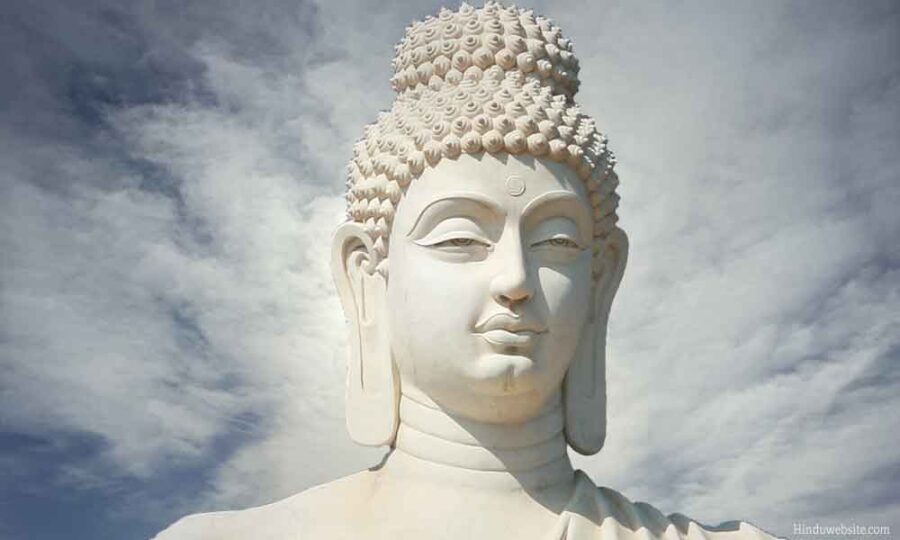The following verses are from Manimekalai, a Tamil Buddhist epic, generally dated around 5th Century CE. It follows the life of Manimekalai, who is the daughter of Madhavi from Silappathikaram (the premier epic in Tamil literature).
O’ Gallant conqueror of Lust,
Eliminator of hateful doctrines,
Great one who strives to do right to men,
Ancient one who doesn’t yearn for heaven,
One who is unperturbed by others thoughts,
Wise One who helps others obtain wisdom,
One whose ears block hateful words,
One whose tongue utters only truth,
One who went to hell to redeem the sinners,
One who eradicates the misery of Nagas,
To praise thy hallowed feet, instead of worshiping,
will be impertinent of my tongue to do,
said the beautiful damsel…
A goddess, Deeva Thilakai takes Manimekalai to the Gomukhi pond on the auspicious day of Vaikasi Visakha (Buddha Poornima?). They pray to Buddha and go around the pond. Manimekalai is given the ‘Amudha Surabhi’ (never empty food bowl) which will satiate the hunger of all living beings.
On receiving the bowl, she is happy and praises Buddha. “You conquered the God of Lust (who tried to disturb Buddha’s meditation under the Bodhi tree). You eliminate the hateful doctrines and show us the true path. You try to do right to all men. You are beyond hell and heaven, having attained true Nirvana. So you don’t yearn for heaven. Others thoughts don’t reach and disturb you. You are the wise one who gives wisdom to others. Your ears close to hateful speech. Your tongue utters only the truth. You visited hell to redeeem sinners there. (Buddha is supposed to have visited Hell in one of his births to redeem the sufferers there). You’ve walked the country of Nagas (South India?) to eradicate their misery. It will be impertinent of my tongue to praise your hallowed feet. I should only bow down and worship you”.
The original in Tamil:
மாரனை வெல்லும் வீர நின்அடி
தீநெறிக் கடும்பகை கடிந்தோய் நின்அடி
பிறர்க்குஅறம் முயலும் பெரியோய் நின்அடி
துறக்கம் வேண்டாத் தொல்லோய் நின்அடி
எண்பிறக்கு ஒழிய இறந்தோய் நின்அடி
கண்பிறர்க்கு அளிக்கும் கண்ணோய் நின்அடி
தீமொழிக்கு அடைத்த செவியோய் நின்அடி
வாய்மொழி சிறந்த நாவோய் நின்னடி
நரகர் துயர்கெட நடப்போய் நின்அடி
உரகர் துயரம் ஒழிப்போய் நின்அடி
வணங்குதல் அல்லது வாழ்த்தல்என் நாவிற்கு
அடங்காது என்ற ஆயிழை…
Notes:
In the Tamil verse, every line ends with ‘hallowed feet’. I have used it only once, to read easy in English. Na.Mu.Venkatasamy Naattar in his commentary helpfully says “Since Manimekalai was overcome with joy, she kept repeating hallowed feet in every line. We can take it at the end of her felicitations”.
Recommended
வாழ்த்த வயதில்லை வணங்குகிறேன் – ‘I’m not old enough to praise you, so I worship you’ is a cliched sentence in Tamil Nadu political oratory in the last decade. So when I found that this phrase had its origin in an epic written 1500 years ago, I was extremely pleased. One keeps finding such nuggets as one explores Tamil literature.
மாரன் – God of Love / Lust
தீநெறி – தீய நெறி – hateful doctrines
கடும்பகை – strong enmity
நின் அடி – your (hallowed) feet
கடிந்தோய் – கடிதல் – removal / elimination
துறக்கம் – heaven
எண்பிறக்கு ஒழிய – பிறரது எண்ணங்கள் தீண்ட முடியாத உயரத்தில் – not touched by others thoughts
இறந்தோய் – one who has given up
கண் பிறர்க்கு – wisdom to others
கண்ணோய் – கண்ணோட்டம் உடையவன் – One who is wise
தீமொழி – hateful words
செவி – ear
வாய்மொழி – வாய்மை + மொழி – true words
நாவோய் – நா + உடையவன் – tongue
நரகர் – sinners
உரகர் – Nagas
வணங்குதல் – Bow / Worship
வாழ்த்தல் – Praise / Bless
நாவிற்கு அடங்காது – my tongue should not do
ஆயிழை -girl wearing beautiful jewels / damsel / woman
Reproduced with permission from Old Tamil Poetry.



